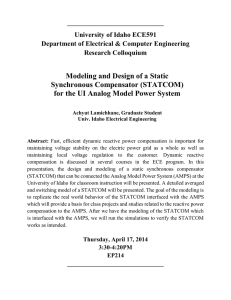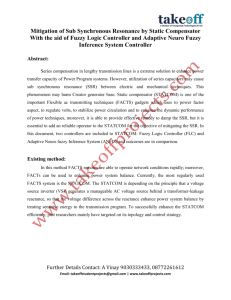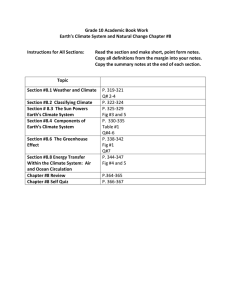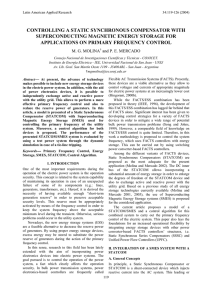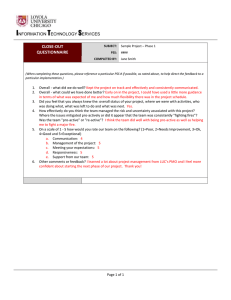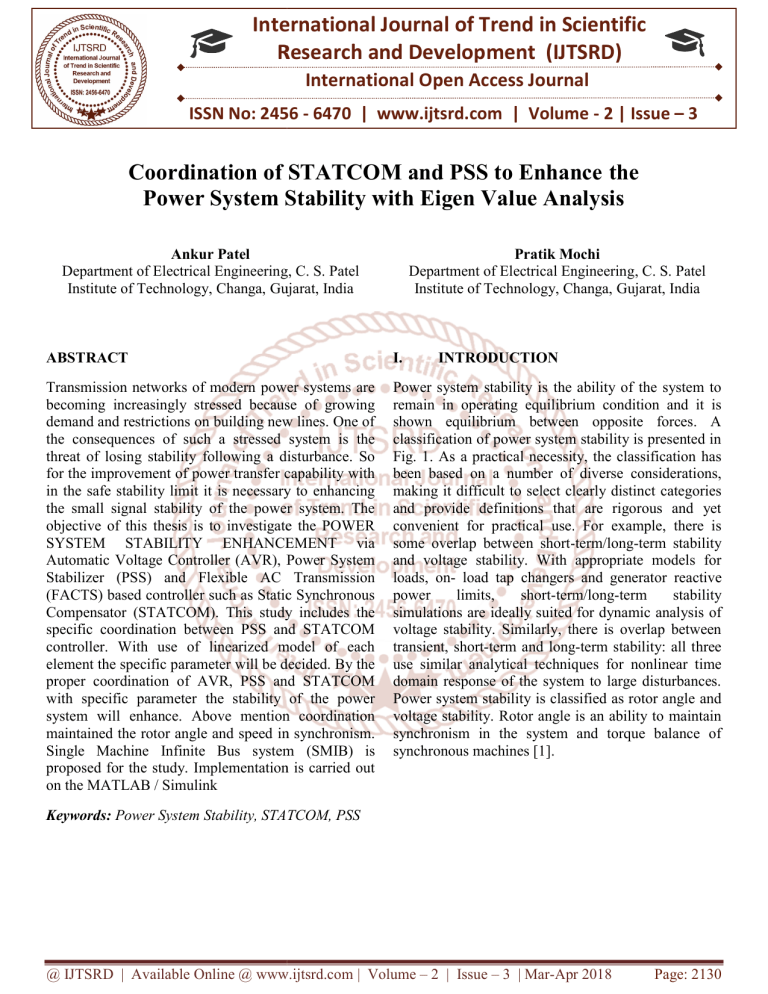
International Journal of Trend in Scientific
Research and Development (IJTSRD)
International Open Access Journal
ISSN No: 2456 - 6470 | www.ijtsrd.com | Volume - 2 | Issue – 3
Coordination of STATCOM and PSS to Enhance the
Power System Stability with Eigen Value Analysis
Ankur Patel
Department of Electrical Engineering
Engineering, C. S. Patel
Institute of Technology, Changa, Gujarat, India
Pratik Mochi
Department of Electrical Engineering,
Engineering C. S. Patel
Institute of Technology, Changa, Gujarat, India
ABSTRACT
I.
Transmission networks of modern power systems are
becoming increasingly stressed because of growing
demand and restrictions on building new lines. One of
the consequences of such a stressed system is the
threat of losing stability following a disturbance. So
for the improvement of power transfer capability with
in the safe stability limit it is necessary to enhancing
the small signal stability of the power system. The
objective of this thesis is to investigate the POWER
SYSTEM STABILITY ENHANCEMENT via
Automatic Voltage Controller (AVR), Power System
Stabilizer (PSS)
S) and Flexible AC Transmission
(FACTS) based controller such as Static Synchronous
Compensator (STATCOM). This study includes the
specific coordination between PSS and STATCOM
controller. With use of linearized model of each
element the specific parameter will be decided. By the
proper coordination of AVR, PSS and STATCOM
with specific parameter the stability of the power
system will enhance. Above mention coordination
maintained the rotor angle and speed in synchronism.
Single Machine Infinite Bus system (SMIB) is
proposed for the study. Implementation is carried out
on the MATLAB / Simulink
Power system stability is the ability of the system to
remain in operating equilibrium condition and it is
shown equilibrium between opposite forces. A
classification of power system stability is presented in
Fig. 1. As a practical necessity, the classification has
been based on a number of diverse considerations,
making it difficult to select clearly distinct categories
and provide definitions that are rigorous and yet
convenient for practical use. For example, there is
some overlap between short--term/long-term stability
and voltage stability. With appropriate models for
loads, on- load tap changers and generator
generat reactive
power
limits,
short-term/long
term/long-term
stability
simulations are ideally suited for dynamic analysis of
voltage stability. Similarly, there is overlap between
transient, short-term
term and long-term
long
stability: all three
use similar analytical techniques
technique for nonlinear time
domain response of the system to large disturbances.
Power system stability is classified as rotor angle and
voltage stability. Rotor angle is an ability to maintain
synchronism in the system and torque balance of
synchronous machines [1].
INTRODUCTION
Keywords: Power System Stability, STATCOM, PSS
@ IJTSRD | Available Online @ www.ijtsrd.com | Volume – 2 | Issue – 3 | Mar-Apr
Apr 2018
Page: 2130
International Journal of Trend in Scientific Research and Development (IJTSRD) ISSN: 2456-6470
Fig 1 Classification of power system stability
II.
Single Machine Infinite Bus (SMIB) system
For the transient stability analysis we used the single
machine connected to a large system through a
transmission Line. Fig. 2 shows the Basic
configuration of SMIB system [3]. For the analysis
purpose the system reduced to the form fig. 3 by using
Thevenin’s equivalent of the transmission network
external to the machine and the adjacent transmission.
Because of the relative size of the system to which the
machine is supplying power, dynamics associated
with the machine will cause virtually no change in the
voltage and frequency of Thevenin’s voltage EB.
Such a voltage and constant frequency is referred to
as an infinite bus [5]. In our study we will begin with
the classical model and gradually increase the model
detailed by accounting for the effects of the dynamics
of the field circuit, excitation system and amortisseurs
[4]. In each case, we will develop the expressions for
the elements of the state matrix as explicit functions
of system parameters.
@ IJTSRD | Available Online @ www.ijtsrd.com | Volume – 2 | Issue – 3 | Mar-Apr 2018
Page: 2131
International Journal of Trend in Scientific Research and Development (IJTSRD) ISSN: 2456-6470
Fig. 2 General configuration of SMIB
Fig. 3 Equivalent circuit of SMIB system
III.
The complete state –space model for the power system,
including the excitation system
System matrix including STATCOM
So, with the STATCOM our system will modify as
below. Finally our system will modified as shown in
simulation diagram. By implementing the STATCOM
in the system the State Matrix will modified as shown
below. The state matrix will modified by the
following parameters, [7,8]
@ IJTSRD | Available Online @ www.ijtsrd.com | Volume – 2 | Issue – 3 | Mar-Apr 2018
Page: 2132
International Journal of Trend in Scientific Research and Development (IJTSRD) ISSN: 2456-6470
IV.
SIMULATION DIAGRAM
Fig. 4 Simulink Model
Fig. 5 Rotor angle (With AVR)
Fig. 6 Rotor speed (With AVR)
@ IJTSRD | Available Online @ www.ijtsrd.com | Volume – 2 | Issue – 3 | Mar-Apr 2018
Page: 2133
International Journal of Trend in Scientific Research and Development (IJTSRD) ISSN: 2456-6470
Fig. 7 Rotor speed (With & without PSS)
Fig. 8 Rotor angle (With & without PSS)
Fig. 9 Rotor speed (With & without STATCOM)
Fig. 10 Rotor angle (With & without STATCOM)
Fig. 11 Eigen values plot with PSS
Fig. 12 Eigen values plot with STATCOM
@ IJTSRD | Available Online @ www.ijtsrd.com | Volume – 2 | Issue – 3 | Mar-Apr 2018
Page: 2134
International Journal of Trend in Scientific Research and Development (IJTSRD) ISSN: 2456-6470
Table 1 Eigen value analysis
Sr no.
Eigen value (with STATCOM)
Eigen value (with PSS)
1
-39.1176124890747 +
-19.1176124890747 +
0.00000000000000i
0.00000000000000i
2
-1.01459489109821 +
-1.01459489109821 +
6.60501661154326i
6.60501661154326i
3
-1.01459489109821 -1.01459489109821 6.60501661154326i
6.60501661154326i
4
-0.739027952329247
-0.739027952329247
+ 0.00000000000000i
+ 0.00000000000000i
5
-19.7196441434040 +
-9.71964414340402 +
12.7407683082933i
12.7407683082933i
6
-19.7196441434040 -9.71964414340402 12.7407683082933i
12.7407683082933i
3) stabilizer” institute of technology, nirma
university, Ahmedabad – 382 481, 08-10
After coordination work the Eigen values shifted left
December, 2011.
hand side of s-plane. So, small signal stability of the
4) H.Boules,Senior Member, IEEE, S. Peres, T.
system increased.
Margotin, M.P. Houry, Member, IEEE “Analysis
V.
CONCLUSION
And Design Of A Robust Coordinated AVR/PSS”
IEEE Transactions on Power Systems, Vol. 13,
From this thesis work outcome is that, the power
No. 2, May 1998.
system (small signal) stability will enhanced by the
proper coordination of PSS and STATCOM. This is 5) Ahmad Rohani, M. Reza Safari Tirtashi, and Reza
Noroozian “Combined Design of PSS and
the new effective approach for improving the small
STATCOM Controllers for Power System
signal stability. The Eigen values are shifted left hand
Stability Enhancement” Journal of Power
side of the s-plane with co-ordination of PSS &
Electronics, Vol. 11, No. 5, September 2011.
STATCOM. After using coordination of PSS &
STATCOM, settling time is decrease and system is 6) S.Sowjanya, Prof.J.Srinivasarao “Design of
stable in less time. This the new effective approach
FACTS device for the improvement of Power
for improving the small signal stability of power
System Stability Using Mathematical Matching
stability.
Controller” Iosr Journal Of Electrical and
Electronics Engineering (Iosrjeee) Issn: 2278ACKNOWLEDGEMENT
1676 Volume 1, Issue 3 (July-Aug. 2012).
The authors are grateful to their family members, 7) Ghazanfar Shahgholian, Pegah Shafaghi,Sepehr
head of the department, colleagues, referees and the
Moalem,Mehdi Mahdavian “Damping Power
team of management for motivating, guiding and
System Oscillations in Single-Machine Infinitesupporting to carry out the research activity for
Bus Power System Using a STATCOM” 2009
betterment of their career.
Second International Conference on Computer
and Electrical Engineering.
REFERENCES
8) Prabha Kundur,“Power System Stability and
1) L. Cong and Y. Wang” Co-ordinated control of
Control”. New York: McGraw-Hill, 1994.
generator excitation and STATCOM for rotor
angle
stability
and
voltage
regulation 9) N.G. Hingorani and L.Gyugi,“Understanding
FACTS –Concepts and Technology of flexible Ac
enhancement of power systems.
Transmission Systems”, Standard Publishers
2) Hitesh d. patel and charvi majmudar “fuzzy logic
Distributors, IEEE Press, New York, 2001.
application to single machine power system
10) www.nptel.iitm.ac.in
@ IJTSRD | Available Online @ www.ijtsrd.com | Volume – 2 | Issue – 3 | Mar-Apr 2018
Page: 2135

